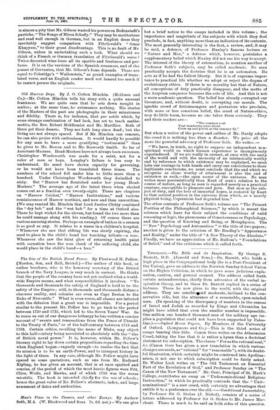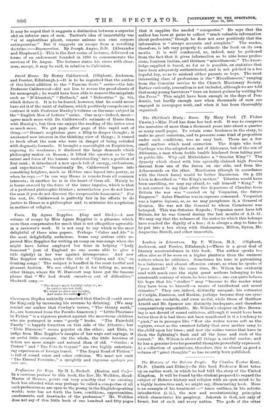THEOLOGY.—The Bible and its Inspiration. By George S. Barrett, D.D.
(Jarrold and Sons.)—Dr. Barrett, who holds a high place in the Congregational body (he is a Past-President of the Union), gave an address to the Norwich Sunday School Union on the Higher Criticism, in which he gave some judicious expla- nation, caution, and general counsel. The address called forth certain animadversions, chiefly from advocates of the verbal in- spiration theory, and to these Dr. Barrett replied in a series of lectures. These he now gives to the world, with the original address. They are sensibleeind moderate, inclined to the con- servative side, but the utterance of a reasonable, open-minded man. (In speaking of the discrepancy of numbers in the census of Israel and Judah as recorded by Kings and Chronicles he might have added that even the smaller number is impossible. One million one hundred thousand men of the military age im- plies a population that could not have been supported by Pales- tine.)—Oxford House Papers. By Members of the University of Oxford. (Longmans and Co.)—This is the third series of essays bearing this title. Canon Gore writes on the Athanasian Creed, taking the line that it is rather a hymn than a doctrinal statement for subscription. The clause " For as the rational soul," &c. (Canon Gore has given a new translation in which various changes are made, as " rational" for " reasonable"), with its doubt- ful illustration, which certainly might be construed into Apollian- arism, is not one to which subscription could be fairly asked. Dr. Walter Lock writes on " The Old Testament an Essential Part of the Revelation of God," and Professor Sanday on " The Canon of the New Testament." Mr. Gent, Principal of St. Mark's College, contributes an essay on " Undenominational Religions Instruction," in which he practically contends that the " Unde- nominational " is a new creed, with certainly no advantages that entitle it to a preference over the old.—Conditional Immortality, by Professor Sir G. Stokes (J. Nisbet), consists of a series of letters addressed by Professor Sir G. Stokes to Mr. James Mar- chant. There is much to be said on both sides of this question. It may be urged that it suggests a distinction between a superior and an inferior race of men. Tacitus's idea of immortality was " si ut sapientibus placet, magnae animas non cum corpore extinguuntur." But it suggests an escape from a revolting doctrine.—Regeneration. By Joseph Angus, D.D. (Alexander and Shepheard.)—This is the first series of lectures, delivered on terms of an endowment founded in 1880 to commemorate the services of Dr. Angus. The lecturer states his views with clear- ness, except, it may be said, in relation to Calvinism.



















































 Previous page
Previous page